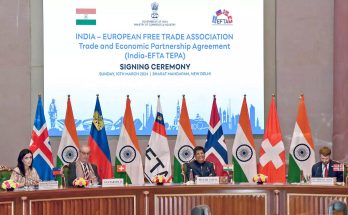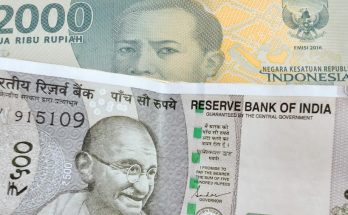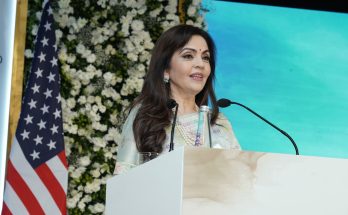Bathed in colours of the Indian tri-colour, the London Bridge looked incandescent in the winter evening as Great Britain rolled out a full-throated charm offensive to court the leader of the world’s largest democracy and one of the world’s fastest growing economies. It was business diplomacy with a capital B, but the Bard and Bollywood commingled to spawn special effects and colours that will suffuse the newly-revitalised partnership between the two countries animated by a shared passion for cricket, chai and a post-colonial creativity to usher in a modern and dynamic relationship.
Splashing Colours of India, in London
 British Prime Minister David Cameron loves to wear his love for India on his elegant sleeves, and has unabashedly declared his strategic intent to build robust multi-faceted ties with Asia’s third largest economy, which has added attractions amid the slowdown in China and large parts of the developed and emerging world. Mr Cameron had visited India thrice, and although Mr Modi has found time to visit London only after travelling around half the world, the ardent suitor is doing everything to serenade the reform-minded India prime minister, who continues to be reviled by sections of the influential British media and intelligentsia on account of the 2002 Gujarat riots.
British Prime Minister David Cameron loves to wear his love for India on his elegant sleeves, and has unabashedly declared his strategic intent to build robust multi-faceted ties with Asia’s third largest economy, which has added attractions amid the slowdown in China and large parts of the developed and emerging world. Mr Cameron had visited India thrice, and although Mr Modi has found time to visit London only after travelling around half the world, the ardent suitor is doing everything to serenade the reform-minded India prime minister, who continues to be reviled by sections of the influential British media and intelligentsia on account of the 2002 Gujarat riots.
Recent incidents of targeting of writers and muzzling of dissent by Hindu zealots haven’t dampened enthusiasm of Mr Cameron, the archetypal pragmatist who known fully well that the business of diplomacy is increasingly business, and how to package it with a dash of showmanship. Therefore, although Mr Modi’s ongoing trip to the UK is not a state visit and lack the pomp and pageantry shown during Chinese President Xi Jinping’s visit to London, Mr Cameron has marshalled a repertoire of unique gestures to make Mr Modi’s visit special and memorable. Iconic British monuments draped in the colours of the Indian flag, the first-ever flypast by Red Arrows sporting Indian colours to welcome the Indian leader, hosting the Indian PM at Chequers and lunch with the Queen are just some of these gestures that bespeak Britain’s desire to usher in a new phase in the India-UK relations.
Symbolism & Substance
Blending symbolism and substance, the talks between Mr Modi and Mr Cameron at 10 Downing Street on November 12 have fleshed out a new template for the India-UK partnership, which is set to be framed by reinvigorated business ties and a broader strategic partnership encompassing new region-specific dialogues and value-added defence and security partnership. The outcomes that have flowed from the Modi-Cameron talks are substantive and transformative.
The joint statement and a separate vision statement outline plans and new initiatives to deepen this multifaceted partnership in diverse areas, including economic development and finance to business, education, skills, health, science and technology, and culture.
B for Business
In the arena of business, a slew of private sector deals amounting to 9.2 billion pounds, including a £1.3 billion pound investment by Vodafone, were unveiled by the two sides. These deals look set to upscale British companies’ presence in diverse sectors including insurance services, finance, healthcare and energy. The 1.3 billion investment by Vodafone is especially significant as it could change the narrative of the India opportunity among the British business elite. The investment encompasses network expansion and upgrades, and new technology and data centres.
Britain is the largest G20 investor in India, with cumulative investment of around 22 billion pounds, which is more than the combined investment of the EU in India. Britain is the third largest investor in India and India is the third largest source of FDI for India. The decision to issue rupee bonds to be listed at the London Stock Exchange for financing railway infrastructure is a defining step that will coalesce vibrant entrepreneurial energies of London and Mumbai. The clean energy package worth 3.2 billion pounds of commercial agreements, including joint research programmes, signals enhanced role by Britain in helping India spur its transition to low-carbon growth.
Strategic Connect
On the strategic plane, the two sides have unveiled a broad-based Defence and International Security Partnership which will provide Britain a bigger role in the Make in India project of indigenising and modernising the country’s military-industrial complex and deepen defence collaboration across the spectrum, including research, training, transfer of defence technologies, cyber security and maritime security. The decision to intensify counter-terror cooperation and setting up of a separate senior officials’ dialogue on South Asia signal the possibilities of the two countries working proactively to counter terrorism emanating from the Afghanistan-Pakistan region. India and the UK “will continue to work together to disrupt all financial and tactical support for terrorist networks including ISIL, Al Qaeda, Lashkar-e-Tayyiba, Hizbul Mujahideen, the Haqqanis, and the associated groups. The two countries reiterate their call for Pakistan to bring the perpetrators of the November 2008 terrorist attack in Mumbai to justice,” said the joint statement.
The Way Ahead
 The joint statement speaks eloquently about the strategic resolve to transform India-UK relations and make it work for over 1.25 billion people of India and Britain. It’s a grand soaring vision that encompasses everything under the sun, but to make sure that the sun does not dim on this relationship of enormous promise, the two sides have to make sure that the vision is matched by concrete time-bound action. Prime Minister Modi alluded to T.S. Eliot in his speech to British parliament. “With apologies to poet T.S. Eliot, we won’t let the shadow fall between the idea and reality.” Hopefully, there will be no thousand visions and revisions and if these grand declarations are to make the desired difference, then both countries have to walk the talk to ensure that these eloquent orations don’t end up “as wind in dry grass/Or rats’ feet over broken glass/In our dry cellar.” For now, the cellar is filled with plenty of old and new wines!
The joint statement speaks eloquently about the strategic resolve to transform India-UK relations and make it work for over 1.25 billion people of India and Britain. It’s a grand soaring vision that encompasses everything under the sun, but to make sure that the sun does not dim on this relationship of enormous promise, the two sides have to make sure that the vision is matched by concrete time-bound action. Prime Minister Modi alluded to T.S. Eliot in his speech to British parliament. “With apologies to poet T.S. Eliot, we won’t let the shadow fall between the idea and reality.” Hopefully, there will be no thousand visions and revisions and if these grand declarations are to make the desired difference, then both countries have to walk the talk to ensure that these eloquent orations don’t end up “as wind in dry grass/Or rats’ feet over broken glass/In our dry cellar.” For now, the cellar is filled with plenty of old and new wines!
(Manish Chand is Editor-in-Chief of India Writes Network, www.indiawrites.org, and is currently in London to provide first-hand reports and analyses on Prime Minister Narendra Modi’s November 12-14 visit to the UK)
Author Profile

- Manish Chand is Founder-CEO and Editor-in-Chief of India Writes Network (www.indiawrites.org) and India and World, a pioneering magazine focused on international affairs. He is CEO/Director of TGII Media Private Limited, an India-based media, publishing, research and consultancy company.
Latest entries
 India and the WorldJuly 9, 2024Defying West, India sets $100 billion trade target with Russia
India and the WorldJuly 9, 2024Defying West, India sets $100 billion trade target with Russia India and the WorldJuly 5, 2024India at SCO: Takes swipe at Pakistan for cross-border terror, pushes alternative to BRI
India and the WorldJuly 5, 2024India at SCO: Takes swipe at Pakistan for cross-border terror, pushes alternative to BRI India and the WorldJune 14, 2024Modi’s Day 1 in Italy: Bonding with Britain, France
India and the WorldJune 14, 2024Modi’s Day 1 in Italy: Bonding with Britain, France India and the WorldJune 13, 2024G7 summit in Italy: Modi to showcase India as leader of Global South
India and the WorldJune 13, 2024G7 summit in Italy: Modi to showcase India as leader of Global South









